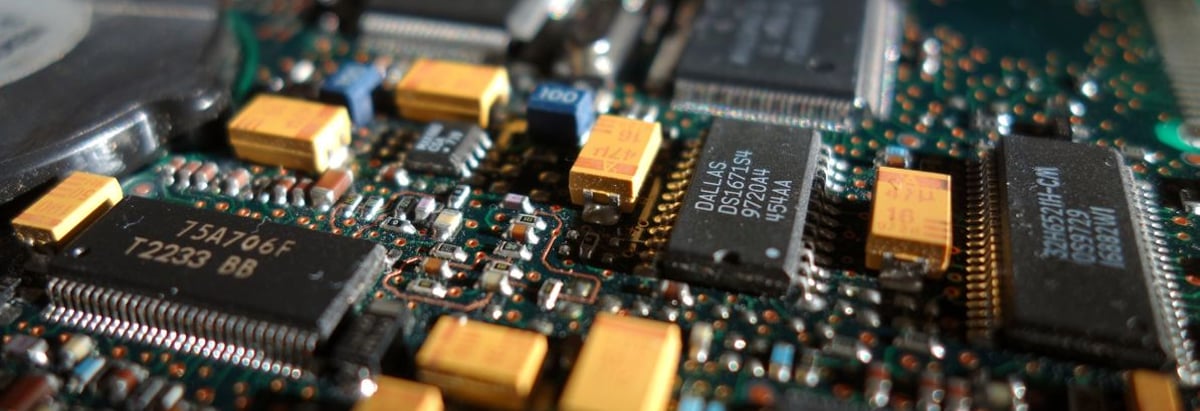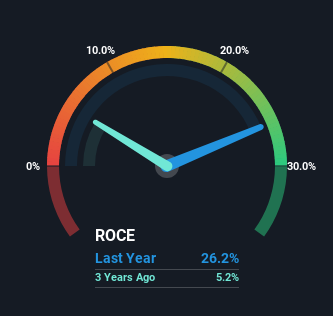- United States
- /
- Semiconductors
- /
- NasdaqGS:MCHP
Why The 26% Return On Capital At Microchip Technology (NASDAQ:MCHP) Should Have Your Attention

If we want to find a stock that could multiply over the long term, what are the underlying trends we should look for? Firstly, we'd want to identify a growing return on capital employed (ROCE) and then alongside that, an ever-increasing base of capital employed. Ultimately, this demonstrates that it's a business that is reinvesting profits at increasing rates of return. Speaking of which, we noticed some great changes in Microchip Technology's (NASDAQ:MCHP) returns on capital, so let's have a look.
Understanding Return On Capital Employed (ROCE)
If you haven't worked with ROCE before, it measures the 'return' (pre-tax profit) a company generates from capital employed in its business. The formula for this calculation on Microchip Technology is:
Return on Capital Employed = Earnings Before Interest and Tax (EBIT) ÷ (Total Assets - Current Liabilities)
0.26 = US$3.5b ÷ (US$17b - US$3.4b) (Based on the trailing twelve months to September 2023).
Thus, Microchip Technology has an ROCE of 26%. That's a fantastic return and not only that, it outpaces the average of 11% earned by companies in a similar industry.
Check out our latest analysis for Microchip Technology

Above you can see how the current ROCE for Microchip Technology compares to its prior returns on capital, but there's only so much you can tell from the past. If you're interested, you can view the analysts predictions in our free report on analyst forecasts for the company.
What Does the ROCE Trend For Microchip Technology Tell Us?
You'd find it hard not to be impressed with the ROCE trend at Microchip Technology. We found that the returns on capital employed over the last five years have risen by 306%. That's not bad because this tells for every dollar invested (capital employed), the company is increasing the amount earned from that dollar. Speaking of capital employed, the company is actually utilizing 20% less than it was five years ago, which can be indicative of a business that's improving its efficiency. A business that's shrinking its asset base like this isn't usually typical of a soon to be multi-bagger company.
The Bottom Line
In the end, Microchip Technology has proven it's capital allocation skills are good with those higher returns from less amount of capital. Since the stock has returned a staggering 138% to shareholders over the last five years, it looks like investors are recognizing these changes. Therefore, we think it would be worth your time to check if these trends are going to continue.
One more thing: We've identified 2 warning signs with Microchip Technology (at least 1 which is potentially serious) , and understanding them would certainly be useful.
If you'd like to see other companies earning high returns, check out our free list of companies earning high returns with solid balance sheets here.
New: Manage All Your Stock Portfolios in One Place
We've created the ultimate portfolio companion for stock investors, and it's free.
• Connect an unlimited number of Portfolios and see your total in one currency
• Be alerted to new Warning Signs or Risks via email or mobile
• Track the Fair Value of your stocks
Have feedback on this article? Concerned about the content? Get in touch with us directly. Alternatively, email editorial-team (at) simplywallst.com.
This article by Simply Wall St is general in nature. We provide commentary based on historical data and analyst forecasts only using an unbiased methodology and our articles are not intended to be financial advice. It does not constitute a recommendation to buy or sell any stock, and does not take account of your objectives, or your financial situation. We aim to bring you long-term focused analysis driven by fundamental data. Note that our analysis may not factor in the latest price-sensitive company announcements or qualitative material. Simply Wall St has no position in any stocks mentioned.
About NasdaqGS:MCHP
Microchip Technology
Engages in the development, manufacture, and sale of smart, connected, and secure embedded control solutions in the Americas, Europe, and Asia.
High growth potential average dividend payer.


